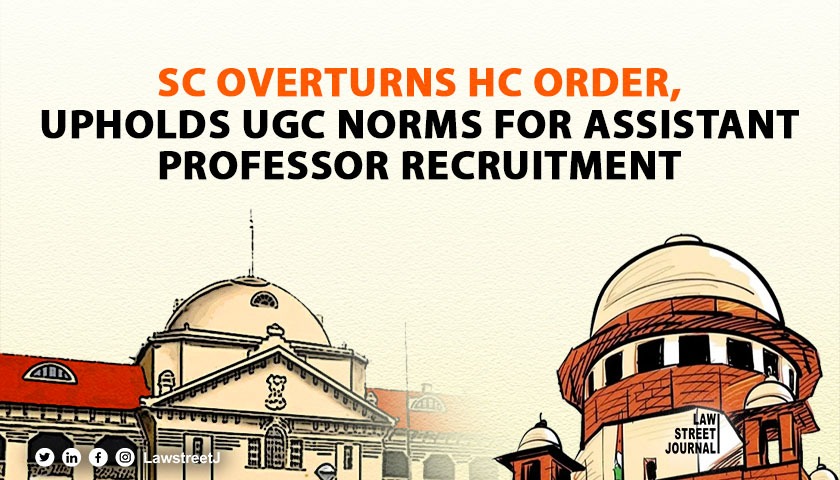NEW DELHI: The Supreme Court has while deciding a writ petition on the basis of affidavits, the writ court’s enquiry ought to be restricted to the case pleaded by the parties and the evidence placed on record.
"It is well-nigh impermissible for the writ court to conjecture and surmise and make out a third case, not pleaded by the parties, based on arguments advanced in course of hearing," a bench of Justices Dipankar Datta and Prashant Kumar Mishra said.
SC Rejects Judicial Overreach in Allahabad HC’s Recruitment Norms Verdict
The court set aside the Allahabad High Court's judgment of January 18, 2024 that read down regulations with regard to teaching experience for the post of Assistant Professor advertised for Allahabad University and its associated degree college.
"We are inclined to the view that the division bench, in the absence of the requisite pleadings and the ramifications that are closely associated with its decision, ought to have adopted a hands-off approach in this regard," the bench said.
UGC Regulations Upheld: Teaching Experience Criteria Clarified by SC
The court said the decision of the High Court was unsustainable in law for exceeding its jurisdiction by resorting to a sort of judicial legislation.
The court said the act of reading down a provision, must be undertaken only if doing so can keep the operation of the statute “within the purpose of the Act and constitutionally valid”.
The bench said a court cannot grant relief claimed by a party in the absence of the requisite pleadings and clarified that the rule for reading down a provision is to be used sparingly, and in limited circumstances.
On appeals filed by Allahabad University and Allahabad Degree College, the bench said the division bench has read down Reg 10(f)(iii) the University Grants Commission (Minimum Qualifications for Appointment of Teachers and other Academic Staff in Universities and Colleges and other Measures for the Maintenance of Standards in Higher Education) Regulations, 2018, on the specious ground.
The bench felt the course of action adopted by the High Court was impermissible.
According to clause 10(f)(iii), previous service of a lecturer on contractual basis would count as ‘teaching experience’ only if the incumbent was drawing total gross emoluments not less than the monthly gross salary of a regularly appointed Assistant Professor.
Respondent candidate Geetanjali Tiwari (Pandey) claimed she was not granted any marks for her past services as guest lecturer and on contractual basis, and thus was not shortlisted for interview.
The court stressed the recruiting authorities can't dilute in any manner the norms and standards prescribed by the statutory provisions but they can always prescribe enhanced norms to have the zone of consideration for interview restricted to those aspirants satisfying the higher criteria.
The court said once Regulation 10 specifically refers to counting of previous regular service, whether national or international, inter alia as Assistant Professor, the division bench in the exercise of its judicial review powers could not have held that the same has no application to one aspiring for appointment as an Assistant Professor.
"Law is well settled that courts cannot add words to a statute or read words into it, which are not there; at the same time, it cannot also read a statute in a manner that results in deletion of words which are there. This is for the simple reason that the court has no power to legislate; hence, it cannot rewrite the legislation. Bearing this principle in mind, the division bench was wholly unjustified in its approach," the bench said.
As a matter of policy, that the UGC has laid down qualifications mandatory in nature for eligibility as well as marks for teaching experience earned from past service of the nature ordained which, of course, is in the nature of a desirable quality and is such that the 2018 Regulations permit for being taken into consideration for shortlisting of candidates, more particularly when the proportion of candidates applying for the number of posts available is quite high, the bench said.
"We find no justification to uphold the view taken by the division bench of the High Court. It was never the intention to deprive aspirants of marks for their teaching experience as Assistant Professors, albeit for shortlisting purposes," the bench said.
The bench felt conditions of eligibility for entitlement to secure marks, which have been laid down, are matters of policy over which the courts have no expertise.
"Judicial review would not extend to cases of the present nature where regulations are framed by experts having a fair measure of idea of what is required and what is not for appointment on teaching posts. The division bench overstepped its limits and treaded a territory, which was forbidden," the bench said.
Allahabad University said as many as 69 candidates were shortlisted and called for interview to the post of Assistant Professor in subject of Sanskrit (the cut-off marks being 87.17), who were competing against each other for appointment on only one unreserved vacancy. The respondent had secured 81 marks and between 87.17 and 81 marks, there were 147 candidates.
The court said the methodology adopted for narrowing the zone of consideration was in sync with the regulations.
The HC ought not to have been swayed in its decision-making process by reason of teaching experience not being a mandatory eligibility criterion, the bench said.
The court felt the HC returned findings in the matter which are not only unwarranted but are wholly unacceptable.















